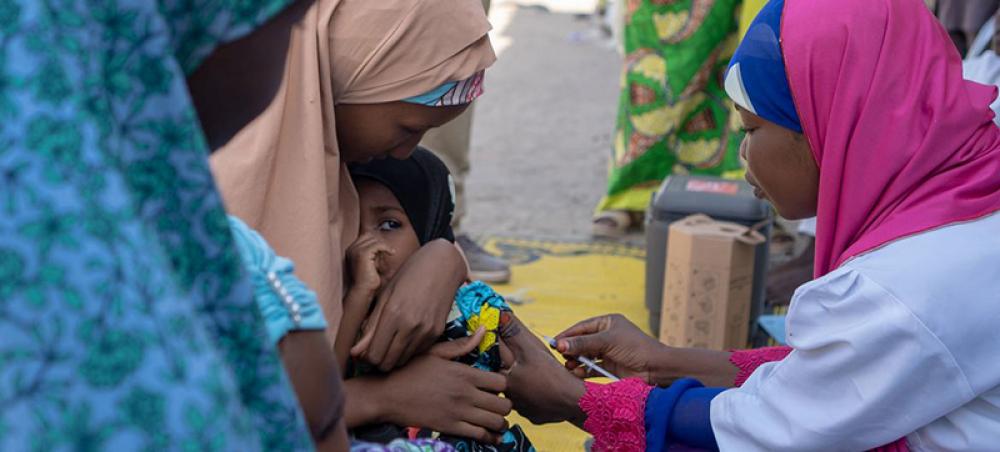Just Earth News | @justearthnews | 25 Oct 2023, 01:21 am Print

A young girl in Nigeria is vaccinated. Photo Courtesy: UNICEF Nigeria
Nigeria introduced the human papillomavirus (HPV) vaccine into its routine immunisation system on Tuesday, aiming to reach 7.7 million girls in the largest single round of HPV vaccinations across Africa.
In Nigeria, cervical cancer is the third most common cancer and the second most frequent cause of cancer deaths among women aged between 15 and 44.
In 2020 – the latest year for which data is available – the country recorded 12,000 new cases and 8,000 deaths from cervical cancer.
Under the new immunisation protocol, girls aged nine-14 will receive a single dose of the vaccine, which is highly effective at preventing infection of HPV types that are known to cause at least 70 per cent of cervical cancers.
“The loss of about 8,000 Nigerian women yearly from a disease that is preventable is completely unacceptable,” said Muhammad Ali Pate, the Coordinating Minister of Health and Social Welfare.
“As a parent myself, I have four daughters, all of them have had the same HPV vaccine to protect them against cervical cancer. I’d like to implore fellow parents to dutifully ensure that this generation of our girls disrupt the preventable loss of lives to cervical cancer in addition to other untold hardship, loss, and pain.”
Vaccination campaign
A five-day mass vaccination campaign in schools and communities will be carried out across 16 states and the Federal Capital Territory during the rollout before being incorporated in routine immunisation schedules within health facilities.
Over 35,000 health workers have been trained in preparation for the campaign and subsequent vaccine delivery to ensure no eligible girl is left behind.
Mobile vaccination units have also been set up to ensure that more remote communities can still access the vaccine.
“This is a pivotal moment in Nigeria’s efforts to lower the burden of cervical cancer – one of the few cancers which can potentially be eliminated through vaccination,” said Dr Walter Kazadi Mulombo, WHO Representative in Nigeria.
“We’re committed to supporting the government increase in access to the HPV vaccine to protect the health and well-being of the next generation of women.”
The second phase of the vaccination introduction is set to begin in May 2024 in an additional 21 states.
‘Profound loss and devastation’
“Every day, cervical cancer inflicts profound loss and devastation on families across Nigeria,” said Thabani Maphosa, Managing Director of Country Programmes Delivery at Gavi.
“And yet, it is a disease that can be prevented. With the HPV vaccine now available in Nigeria for eligible adolescent girls at no cost, communities now have the most effective tool to fight cervical cancer and the nation has an opportunity, collectively, to save millions of lives.”
The vaccine is being provided for free by the Federal Ministry of Health through the National Primary Health Care Development Agency with support from Gavi, the Vaccine Alliance, the UN Children’s Fund (UNICEF), World Health Organization (WHO), and other partners.
WHO recommends that HPV vaccination be included in the national immunisation programmes of countries where cervical cancer is a public health priority, where it is cost-effective, and where sustainable implementation is feasible. As such, Nigeria has prioritised the addition of the vaccine to the country’s routine immunisation schedule.
Easing shortages
While global supply shortages have slowed Gavi-supported vaccine introductions in the past, supply issues are beginning to ease thanks to years of market shaping efforts to develop a more robust HPV vaccine market and WHO’s single dose recommendation.
Recognizing this critical opportunity to reach more girls and accelerate efforts to prevent cervical cancer, the Gavi board approved the revitalization of its HPV vaccine programme with an investment of over $600 million by end of 2025.
With the additional funding, Gavi and its partners have set an ambitious goal to reach over 86 million girls by 2025, aiming to avert over 1.4 million future deaths from cervical cancer. To support these efforts, Gavi is co-financing the cost of the vaccines and providing technical support for the introduction.
‘Life-saving intervention’
UNICEF, meanwhile, has procured nearly 15 million HPV vaccines on behalf of the Government of Nigeria and has produced informational materials, including radio and TV jingles in multiple local languages to help dispel misinformation around HPV vaccinations.
- New hybrid Mpox strain surfaces in UK and India — WHO sounds global alert
- Deadly weight: Obesity now responsible for 1 in 10 infection deaths worldwide
- Coffee and tea: This everyday drink may help protect your brain from dementia
- Happy Chocolate Day! The sweet secret behind chocolate’s hidden benefits
- Cambridge study finds menopause affects memory, mood, and sleep





-1763561110.jpg)
